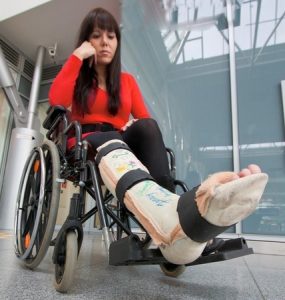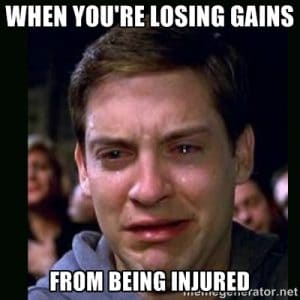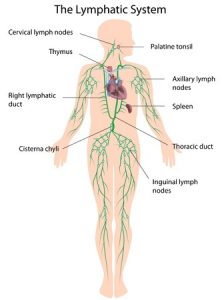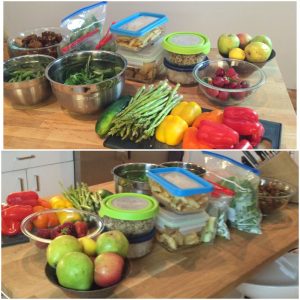
That was me a week ago after way too much traveling and being around a LOT of germs. I was totally wrecked, in bed, fever, cough, throwing up, the works for days. Ugh.
I rarely get sick, so when I do it really throws a monkey wrench into my training and routine – not to mention my work!
It’s a lot like what happens when you’ve just had an injury, or are recovering from surgery.
While you’re not “sick” per se, your body is in a state that needs a lot of immune system support – and knowing what to do – and what NOT to do – can mean the difference between a speedy recovery that has you back on your feet with minimal downtime and a long, drawn out process that you’re forever backsliding within.

While I would LOVE to be able to send you a customized plan while you’re recovering I should clarify – neither I, nor anyone else on the internet who is not directly involved in your recovery process, has knowledge of your health history or is working in some one-on-one capacity with you – is qualified to prescribe exercises to you.
That aside, I want you to really think about something else – training just your upper body while recovering from a knee surgery for example might not be a great idea.
Training and exercise put a certain amount of stress on our system. That’s a good thing, because under normal circumstances, it forces a breakdown and repair process, creates an adaptogenic response and we get stronger.
But you can’t just isolate the experience of exercise to that part of your body you’re training. It’s inevitable. Your body is an interconnected system and it gets fully involved when we’re training any part.
Now I know that there can be some real anxiety about missing a day, a week or even a month of exercise – like it’s going to turn us into a total lump of fat, or reduce all of our gains – and that to maintain our physique we MUST find a way to exercise some part of their body so we can minimize the “damage” to our appearance that must surely happen as a result of NOT EXERCISING.

I mean, last week I was totally bummed that I had to take a break from the challenge (I was on Day 5, I had just started it) and I really wanted to get back on track because I felt like I had just gotten into a good routine!
But instead of trying to push myself to do a workout anyway, I focused on the two most important things that actually shortened my downtime: nutrients and rest.
I know, I know – not some big revelation, right? haha. But doing this right is often overlooked, and is one of the biggest causes of extended illness, extended recovery time (for injuries) and a real decrease in your ability to come back 100%.
This was an important shift I had to make myself around training and recovery, and I want to share what I know with you so you can get better faster, reduce your recovery time, and come back to your peak state stronger than ever.
When you’re sick, your body is fighting off an infection of some kind. It is using the resources it has at its disposal to bring you back to your normal state as quickly as possible. The absolute worst thing you could do is try to allocate some of that energy towards something else (a workout) and not let your body heal first.

If they were constantly getting sidetracked checking their phones, taking hour long lunch breaks or napping on the job, it would take them a lot longer to rescue you!
And that’s exactly how you have to think about the way you treat your body. It contains your own personal rescue team, ready to jump into action and work nonstop, 24/7, until you feel better.

When we train, we create micro tears that the body then heals and rebuilds as muscle. It’s a kind of stress that the body responds to and deals with, in optimal conditions.
When you’re sick, your body needs its resources to dig you out of the ravine. Adding additional stress is like taking half that rescue crew and asking them to go work another job.
You’re going to be stuck longer, and you’ve only got a skeleton crew on the other job, so chances are it’s not going to be nearly as effective. As in, your workout won’t really make much of an impact. You’re not doing yourself any favors forcing a workout when your immune system is compromised.
It’s a similar situation with recovery. When you’re injured or recovering from an injury, you want to think of your body’s defense and restoration system as a team that is working for you. Training your upper body while your lower body is in a state of repair may not be an ideal allocation of resources, as you’re going to be effecting the repair process.
That doesn’t mean you’re not supposed to move at all. In fact, the body’s primary immune response system DEPENDS on you to move so it can circulate.

It’s vital that you follow the instructions of your primary caregiver and anyone you’re working with. Why am I not qualified to give blanket advice about your situation? Not just because I’m not a doctor! Because I don’t know YOUR health history.
Even if I was working one-on-one with you as your personal trainer, in person, I’d be talking to your doctor and getting clearance from them on what would support your body the most during the healing process.
So I strongly advise you NOT to go outside of this thinking that just because you can’t do any jumping moves you should start doing everything else that stresses your system out. That’s the real issue – creating more stress in your body when you’re trying to get better is the opposite of healing.
I’m not telling you that you can’t exercise or move, or walk, do water aerobics or yoga or spinning – I’m saying if you’re doing anything while recovering from an injury, be sure it’s with your doctor’s blessing and that it’s appropriate for where you’re at. And if you’re taking care of yourself after a non-surgical procedure and aren’t working with a doctor, be extremely circumspect in your choice to do too much.

The #1 think you CAN do while you’re healing from anything – from a cold to knee surgery is DIAL IN YOUR NUTRITION.
Okay, let’s go back to that all-star rescue team working overtime to dig you out of the ravine you drove off into. What are those guys eating to sustain them for this around the clock work schedule?
If it were me, I’d really hope they were eating the best possible food so they had consistent energy, were sharp and alert, and had the stamina to help me for as long as I needed them. You picking up what I’m putting down here?
Feed your body junk or starve it when you’re recovering, those guys – your immune defenders – aren’t going to have the energy they need to haul your ass out of the ravine.
I know it’s tempting to think that because you’re not exercising you shouldn’t eat as much – and you should definitely allow your appetite to dictate how much food you eat.
Just don’t fall into the trap of eating junk or convenience food – this is THE time to eat the best foods possible. This is not the time to take an NSA day.

Focus on the macronutrients, getting in unprocessed carbohydrates like fruit and sprouted, soaked or fermented grains, eat lean, complete protein-rich foods, eat good healthy fats and greens.
You can take a proactive approach with your nutrition too if you have an upcoming surgery like my aunt just did on her lung. I’d recommend really focusing your nutrient intake on healthy superfoods rich in the nutrients that will support you going into the process.
Taking antibiotics and prescription medications can wreak havoc on your digestive system – so why not go in armed with good fuel and a solid base? I’m happy to report she’s having a super speedy recovery, and while I can’t attribute her fast bounce back to just her food alone, that certainly was a contributing factor in her energy.
Not to mention, going into a surgery is always really fraught with unknowns, and your food intake before and after you go in is something you CAN control – so why not do it?
I know recovery is frustrating. I know it’s easy to feel like you want to exercise and do something.

Give yourself this opportunity to feed yourself the best food and avoid anything that will cause additional stress and work to your system. Stay away from processed foods, added sugar and excess caffeine.
Everything in your body, from the tissue that supports your skeleton to the neurons that fire signals from your brain to your feet run on the energy that’s created by the food we eat, and I personally would prefer to have body tissue made from real, whole foods than tissue constantly bombarded by chemical byproducts of food processing from something that came out of a box and went through a factory full of chemicals and processes I’d never even see or hear about.
Think about your liver, working hard all day for you to regulate your blood sugar levels, metabolize fat, and regulate your protein levels – or the small intestines working hard to absorb the available nutrients in your food so you have the necessary building blocks for tissue, growth and energy.
Your body exists in a constant state of energy balancing, and it is depending on what you feed it and how you treat it to be able to perform its functions optimally.
A lot of the time, we GET sick because we’re carelessly overindulging in too much of certain substances and not giving our body the nutrients it needs to do its important jobs.
But when you know you’re going to be down for the count for a few weeks or longer, or you end up getting sick, why not use it as the perfect opportunity to FOCUS on your nutrition and give your immune system team the support it needs to get you back in the clear as soon as possible?

- Sliced lemon
- Slivered ginger root – I peel the bark and mince it, about a 1/4-1/2 tsp worth. Dried ginger is fine too, a pinch in hot water works.
- Slivered turmeric – same process as the ginger. I haven’t tried dried turmeric but it would be great.
- Slivered garlic. just a couple slivers. Might sound weird, but garlic contains some mighty excellent nutrients for the body.
I also stay super focused on nourishing my body with greens and optimal foods.
Here’s a great 5-step food prep and recipes guide that can help you with some nutrient-dense meals and great recipe ideas.
If you feel like you need to really give your body some extra support, try the cleansing, immune boosting smoothies and tea mentioned in my Easy 1-day “Detox” post which is more about restoring your system, and supporting the body’s natural detoxification pathways.
I recommend following a balanced eating approach and getting your body fueled with the best food available – not just when you’re sick or injured, but as often as you can.
This page contains links to my meal plans that all have wonderful, healthy and balanced recipes, weekly shopping lists, daily menus, food prep steps – and are gluten and dairy free, as well as contain Vegetarian options for my non-meat/fish eaters.
If you’re proactive in supporting your body when it’s sick or injured you’ll be able to heal more quickly, and set yourself up for far greater success in your upcoming workouts than you would if you force yourself to work out when you’re sick or injured.
Fueling your body with the nutrients it needs to recover will make for a speedy recovery – and you’ll have more energy when you are ready to get back to regular exercise!
Please leave me your comments below, as I’m always interested in what you think! Have you been sick recently or had an injury? Tell me about your recovery!
And if you like this post, please share it with a friend and give someone else a chance to get better more quickly when they’re down for the count.
Thank you for reading! You’re the reason I’m here.
